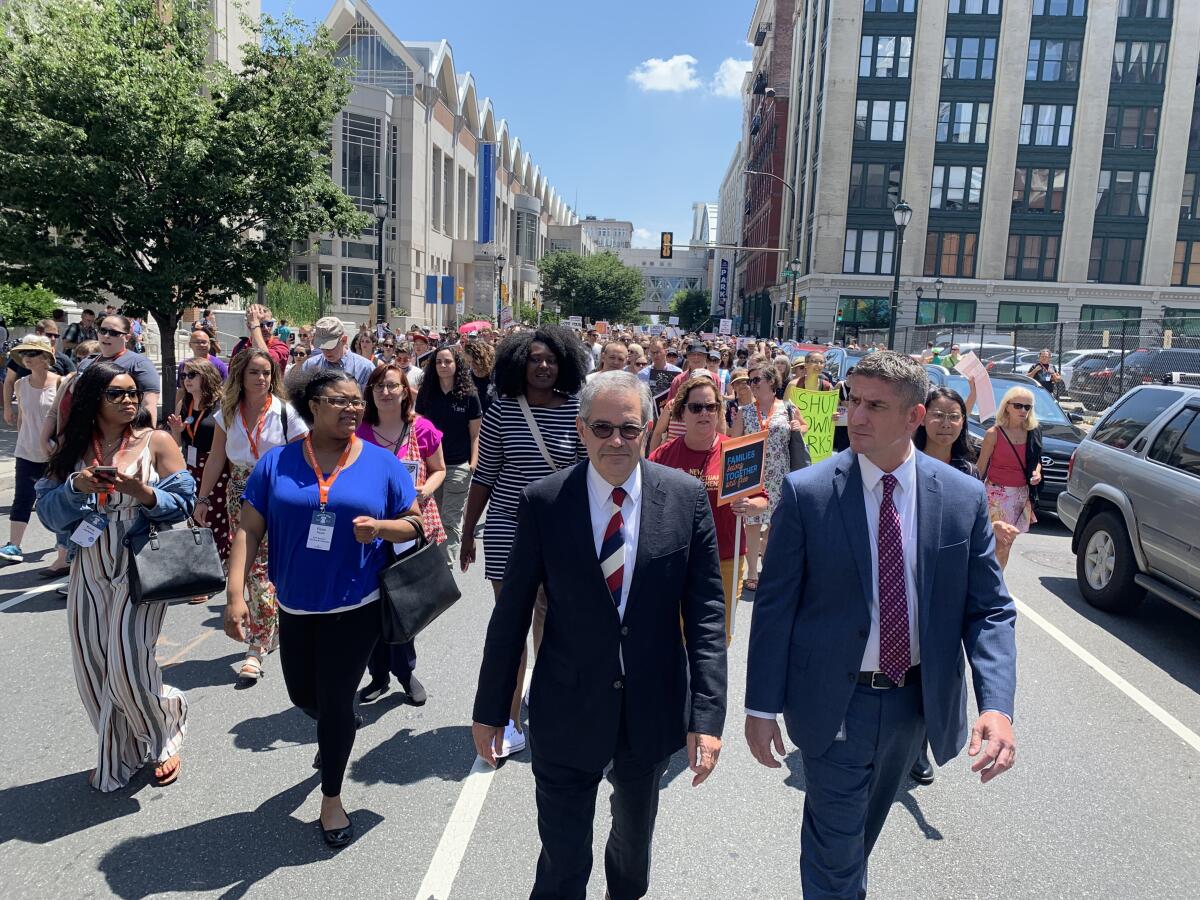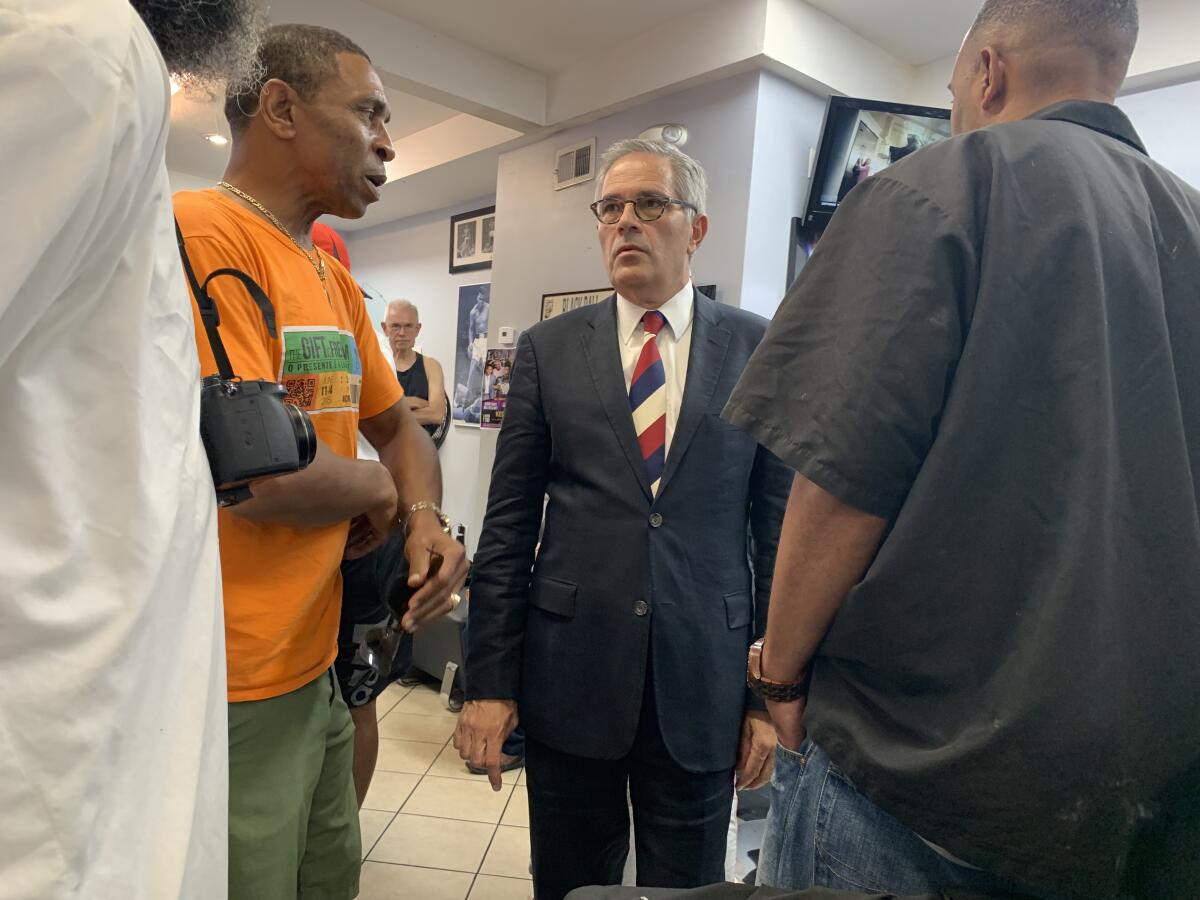Once tough-on-crime prosecutors now push progressive reforms

- Share via
PHILADELPHIA — District attorneys used to brag about how many criminals they threw behind bars. Now an increasing number boast of how many they kept out of prison.
A wave of progressive prosecutors has won elections in big cities and suburbs, and it is challenging long-held law-and-order conventions. Sounding more like liberal activists and civil rights lawyers than traditional hard-nosed DAs, the prosecutors are seeking to transform criminal justice systems.
For the record:
9:29 a.m. Aug. 5, 2019An earlier version of this article incorrectly stated that Krasner’s prosecutors have reduced future incarceration by a total of 1,500 years, a savings to the state of about $60 million. Updated figures show it is 4,179 years, or more than $167 million.
Progressive prosecutors have been elected in often-contentious contests in Philadelphia, Houston, Chicago, Boston, Tampa, Fla., and Durham, N.C., among other places. In June, progressives took down incumbents in two populous counties in Washington’s northern Virginia suburbs.
Los Angeles voters could weigh in next year if the progressive district attorney of San Francisco, George Gascon, a former assistant chief of the LAPD, decides to challenge incumbent Jackie Lacey.
The new-style prosecutors are seeking to end mass incarceration, eliminate cash bail, divert more defendants into drug treatment programs, eradicate the death penalty and reverse wrongful convictions. Their advocacy has intensified a national debate over criminal justice reform, which has moved into the heart of the presidential primaries.
They say they have no choice: For too long, they say, a deeply flawed system has harmed too many people.
“The old policies don’t just break individuals, many of whom did not need to be broken, they break communities and they break cities for a whole host of economic and social reasons,” said Larry Krasner, who won election in 2017 to become district attorney of this city of 1.6 million residents and has become one of the best known of the new wave of prosecutors.
“Being tough-on-crime has been a wrecking ball to cities,” he said.
Their critics, who include many police chiefs, police unions, conservative legislators, judges and the Trump administration contend the new policies will lead to more crime after years of improvements.
“Philadelphia doesn’t have a prosecutor,” says U.S. Atty. William McSwain, the top federal law enforcement official in the city and a leading adversary of Krasner. “The city has a public defender with power.”
McSwain pointed to police statistics that showed homicides up 8% and shootings up 7% during Krasner’s first 18 months in office. Krasner’s supporters point to statistics that show overall violent crime is down 7% during that same period.
On Monday, Atty. Gen. William Barr blasted the wave of progressive prosecutors as “anti-law enforcement and “dangerous to public safety.”
The district attorneys “style themselves themselves as ‘social justice’ reformers,” Barr told a Fraternal Order of Police convention in New Orleans. But they spend “their time undercutting the police, letting criminals off the hook, and refusing to enforce the law,” he added.
Legal and political observers say the trend toward liberal prosecutors has been years in the making, especially in big cities and suburbs that have diverse and liberal electorates. Prosecutors are among the system’s most powerful players, and criminal justice reform advocates have been encouraging progressive candidates to enter races that have historically not drawn a challenger.
“This is a real movement that could have real consequences, and this new crop of progressive prosecutors are looking at the job in a very different way,” said Angela J. Davis, a law professor at American University in Washington, D.C., who has written about the trend. “Historically prosecutors are largely responsible for a lot of the problems we have in the criminal justice system,” she said. “They also have the power to correct them.”
Kim Foxx, who was elected in 2016 to be the state’s attorney for Cook County, which includes Chicago, says she has worked hard to reduce the number of low-level, nonviolent offenders held on cash bail or sent to prison. Her policies, she says, have helped reduce by about 4,000 the total number of people incarcerated and held in jail pending trials.
Overall crime has declined, with homicides down 11% so far this year and nearly 30% compared with the same period in 2016.
“The people we are diverting from jail aren’t the people who keep you up at night,” said Foxx, who has dealt with some controversies, including how her office handled the prosecution of actor Jussie Smollett on charges he lied to police about being beaten in a hate crime. “They are involved in retail theft and drugs. By diverting those offenders, we can focus more attention on violent crime.”
At the vanguard of the progressive DA movement is Krasner, a trim, gray-haired 58-year-old former defense lawyer with no prosecutorial experience prior to his election. Brusque and unapologetic, Krasner shocked the city’s political establishment when he won the Democratic primary in 2017 and has gained national attention both for his policies and his blunt rhetoric and outspoken advocacy.

In interviews, he called McSwain, the U.S. attorney, a “liar,” and former prosecutors in his office “war criminals.” He accused the state’s Democratic attorney general of being “fork tongued” and Republicans in the state legislature of being members of a “right-wing hootenanny.”
Krasner has also openly clashed with the police union, saying its leadership is seeking to stymie his reform efforts.
“The culture that came out of Frank Rizzo was racist, brutal, toxic, tribal, and that long shadow still hangs over the department especially at the senior and supervisory levels,” he said, referring to a former police commissioner turned mayor in the 1970s.
The president of the local police union declined to comment through spokespeople.
Like many progressive prosecutors, Krasner beefed up a unit to reverse wrongful convictions. In the last 18 months, prosecutors say, it has exonerated nine individuals, all convicted of homicide.
Krasner is racing to diversify the ranks of the 300 lawyers in his office, launching a nationwide recruitment campaign.
The office has implemented policies to reduce the number of people required to post cash bail, which he calls unfair to the poor. And prosecutors are seeking to keep low-level, nonviolent offenses out of jail and prison by diverting them into drug treatment and other programs.
Since he took office, Krasner says, more than 1,750 people have been freed on their own recognizance who, in the past, would have been required to make bail. In seeking more lenient sentences, his prosecutors have reduced future incarceration by a total of 4,179 years, a savings to the state of about $167 million, he says. His reforms, he adds, have led to a nearly 30% decrease in the city’s jail population.
Krasner acknowledges he doesn’t have unilateral power to change the system. His office has struggled, for example, to ensure that sex workers with multiple convictions for prostitution are diverted into a program that provides counseling, drug treatment and other services.
The prosecutor and his aides blame a requirement that those sex workers be charged with prostitution to be considered for the court-administered treatment program. His office routinely drops charges against first- and second-time offenders.
But prostitutes don’t want to enter the rigorous initiative or cannot complete it, prosecutors say, so they end up with convictions on their records. Last year, more than 150 people were found guilty of the offense.
Krasner and his aides concede that the Catch-22 is leading to more convictions than they had envisioned and those sex workers are not getting the help they need. Prosecutors also have concerns that the program is discriminatory because it will not accept men or transgender individuals.
The key test for progressives will be whether they can pull off their goal of fewer people behind bars without sending crime rates up. Crime in most major U.S. cities has dropped dramatically since the huge spike in the 1970s and 1980s, but no one entirely understands why and whether a less punitive system will reverse that trend.
The rush to enact reforms has made conservatives and police officials nervous.
“The number one job of a prosecutor is to be concerned with public safety, and the data contradicts everything he is saying,” says U.S. Atty. McSwain, who contends that the number of homicides and shootings would be higher if his office hadn’t boosted prosecutions of violent criminals. “I am containing the damage,” he said.
Several local judges, who spoke on condition of anonymity, agreed with McSwain’s assessment — at least in part. They said crime is being under-reported by police and citizens because they do not think prosecutors will pursue certain low-level offenses, including drug possession and distribution or petty thefts.
“What’s the point in reporting a crime if you know the guy will remain on the street,” asked one judge. “Why bother?”
The lax enforcement and prosecution, critics say, have emboldened street criminals.
“They think they will get off easier now,” said Richard Sax, a former prosecutor who retired before Krasner took office. “The message is that the district attorney is looking out for defendants. It’s like there are two defense lawyers in the courtroom now.”
Krasner says he doesn’t want to focus too much on short-term results and believes his policies will eventually help transform the city.
Reducing the number of people with felony convictions and slashing prison populations, Krasner says, will lead to higher employment and graduation rates. The tax burden will then be spread more evenly among residents, encouraging more people and businesses to move to Philadelphia. Families and neighborhoods, he suggests, will grow stronger with fewer men spending their prime years behind bars.
“Progress is going to be made for the 5-year-old kid and the kindergarten kids who are in public schools right now,” he said. “It’s not an overnight process.”
“For meaningful and permanent change,” he added, “you are looking at decades.”
More to Read
Get the L.A. Times Politics newsletter
Deeply reported insights into legislation, politics and policy from Sacramento, Washington and beyond. In your inbox three times per week.
You may occasionally receive promotional content from the Los Angeles Times.










